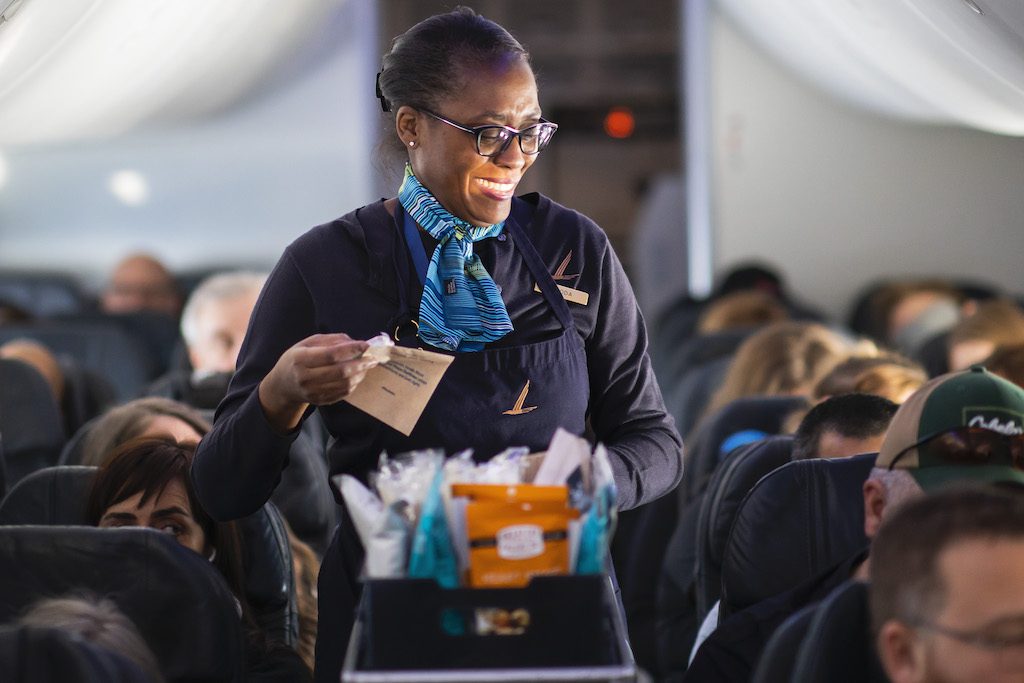Skift Take
Sara Nelson only represents one work group, with members at a few U.S. airlines. But she is the most influential labor figure in the airline industry. So that's why people will want to know her thoughts on the recovery.
U.S. airlines will need to shed union jobs no matter how many billions of dollars of government money they receive, Sara Nelson, the leader of the nation’s most powerful flight attendant union, said Friday in a video discussion with Skift founder and CEO Rafat Ali.
Nelson, leader of the Association of Flight Attendants, or AFA, the union representing workers at United Airlines, Alaska Airlines and Frontier Airlines, was instrumental in shaping the first round of government bailouts, $25 billion in grants to protect worker paychecks through Sept. 30. At the time, airline executives had hoped that might be enough money to bridge the gap until demand returned.
Now, however, it’s clear this will not happen. While most airlines say demand has improved in the past four weeks, it’s nowhere close to where it should be this time of year. Nelson said it’s possible Congress might extend paycheck protections for four more months, but even then, the medium-term prognosis is not good.
“Even if we get that through the end of January, we know that the industry won’t be completely fully recovered,” she told Ali on his weekly video series, The Long View. “We will use this time with our airlines to create the optimal options for people to be able to take themselves off the seniority list, either for a period of time, and come back later, or possibly bridge into a retirement.”
No Concessions
In previous crises, airlines have asked unions to make concessions so they can lower costs. But the AFA has no interest making major contractual changes this time, Nelson said.
Airline labor unions recently regained significant leverage in negotiations, after a prolonged period of industry profits, and union leaders do not want to give up those victories.
“Following the bankruptcies and the mergers, this was really supposed to be the time that workers were recapturing a lot of the value that we have created, and a lot of our losses, frankly, from before,” Nelson said. “One thing that we are going to be very clear about is that while that process may be delayed because of this, what we don’t want to see happen is a second ratcheting down of the value of our careers.”
It is possible this approach could lead to furloughs, though Nelson said she is hopeful airlines will persuade enough flight attendants to leave voluntarily.
“We are not interested in any long-term adjustments to our contracts, to our pay, our benefits, our work rules, because we’ve already been there,” she said. “We have already reduced labor costs going into this. Labor costs are not the reasons that the airlines are going to be struggling. It’s demand.”
More Protections
Nelson, who likes to call her members aviation’s first responders, said the government has not kept flight attendants safe amid the pandemic. She said that’s a problem not only for individual flight attendants, but also for the broader public, since her members travel so much and can spread illness.
At first, the union tried to get each airplane stocked with N95 masks to protect flight attendants against Covid-19, but that became impossible once hospitals and health clinics reported a shortage. Next, the AFA lobbied the federal government to require passengers to wear masks on planes. Most airlines are now mandating them, but the government still has not issued a requirement.
“It was very important to get those mask requirements in place,” she said. “We wish that had come through the federal government but we do want to recognize that the airlines acted relatively quickly,” she said.
Watch the entire interview below.
Have a confidential tip for Skift? Get in touch
Tags: airlines, covid-19, The Long View, thelongview
Photo credit: An Alaska Airlines flight attendant serves snacks during happier times. Alaska Airlines
